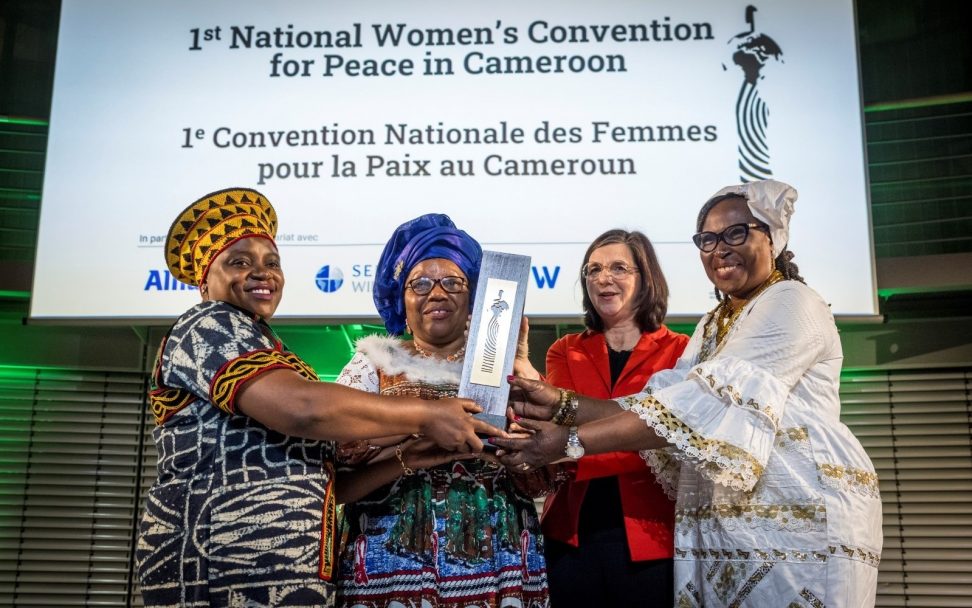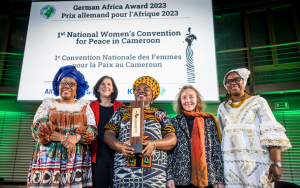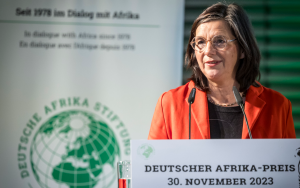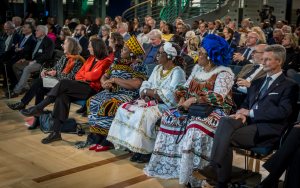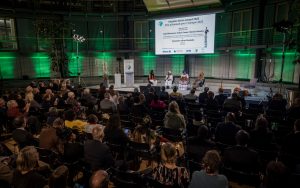German Africa Award 2023 went to the Cameroonian women’s peace platform “1st National Women’s Convention for Peace in Cameroon”.
For its significant contribution to conflict resolution and its pioneering work in promoting dialogue for peace and reconciliation in Cameroon, the women’s peace platform “1st National Women’s Convention for Peace in Cameroon” received the German Africa Award 2023. It is the first time ever that a collective has received this prestigious award. With over 1 500 women from all 10 regions and 58 districts of the country, the platform represents a unique association, promoting peace and dialogue, which is not only an inspiration for the women in Cameroon, but also for the African continent and worldwide.
The security situation in Cameroon has been tense for years: in the Northwest and Southwest regions, various separatist groups have been fighting against the government army for an independent “Ambazonia” in the so-called Anglophone crisis since 2017; in the Far North region, there have been deadly attacks and kidnappings by Boko Haram since 2014; and in the East region, Seleka rebels from the neighbouring Central African Republic have been committing violent crimes against civil society. These three armed conflicts are responsible for approximately two million refugees and internally displaced persons. Women and children are often among the victims and are particularly hard hit by the consequences of the conflicts. Nevertheless, or precisely because of this, it is primarily women who provide assistance to traumatised victims and relatives in the affected areas, take in refugees and act as mediators between armed groups and the military. However, women are largely excluded from the official peace negotiations. The delegations at the attempted negotiations between the government and the separatists in 2020, for example, consisted exclusively of men.
This is what the Women’s Peace Platform aims to counteract. In July 2021, 1 500 women from all regions of the country came together to share their experiences and jointly seek solutions to their country’s conflicts. After three days of exchange, the women peace activists, war victims, soldiers, domestic workers, policewomen, students, professors, market women and lawyers adopted a joint “Women’s Appeal for Peace”, which was handed over to the government with media attention. It contained demands for an immediate ceasefire, an immediate resumption of dialogue between the government and the separatists, the involvement of women as peace mediators, the strengthening of disarmament, demobilisation and reintegration centres, and the creation of centres for psychosocial care for victims of violence. Subsequently, the platform of the same name was founded out of the convention with 38 member organisations at that time. And now, there are 80 organisations doing important work in the 10 regions of Cameroon, for example with internally displaced persons, for the protection of children, the promotion of education also in conflict areas or in the area of gender-based violence.
Beyond this daily work, the women are involved in the platform, which has democratically elected structures, such as the rotating steering committee and the council of the wise, in which the regions are always equally represented. In September 2022, the platform organised a simulation of peace negotiations for the three major conflicts in the country. Observers from international organisations, but also from the Cameroonian government and politics were invited, and separatist leaders from the diaspora were also connected via livestream. In three regional committees, the women negotiated a peace agreement for each conflict and a women’s peace treaty linking the conflict regions, which was handed over to the government at the end.
At a time when all signs point to military intervention, the “1st National Women’s Convention for Peace in Cameroon” thus remains the only initiative accepted by all conflict actors that continues to focus on dialogue, negotiation and reconciliation and at the same time significantly promotes social equality and the political participation of women.
In doing so, the women not only work in an immensely hostile and dangerous environment – the majority of them have experienced violence themselves and are also exposed to daily dangers to their own and their family’s lives through the work they do for society in their organisations. But they also have to deal with their own differences, which can sometimes seem insurmountable in view of different experiences of conflict as well as cultural, economic and political backgrounds, and overcome them for their common goal. The fact that this happens successfully makes the Women’s Platform a shining example of approaches to conflict resolution that can be applied in many conflicts around the world. For it is those who are most affected by conflicts, namely women, who have the courage and determination to engage in dialogue and continue peace work despite all threats, obstacles and negative framework conditions. The fact that women must therefore also be actively involved in conflict resolution has been rhetorically known since UN Resolution 1325. The Cameroonian Women’s Peace Platform proves in practice what this involvement and thus also sustainable approaches to conflict situations can look like.
The German Africa Award 2023 was awarded on November 30, 2023 in Berlin and accepted on behalf of the women of the Platform by Sally Mboumien, Special Rapporteur on gender-based violence, Esther Omam and Marthe Wandou, both on the Council of the Wise.
Sally Mboumien is the founder and executive director of Common Action for Gender Development (COMAGEND), an organisation that works to realise women’s and girls’ rights to sexual and reproductive health. She is also the General Coordinator of the South-West/North-West Women’s Taskforce (SNWOT), a coalition to end conflict in the North-West and South-West regions of Cameroon. She is the women’s representative on the National Steering Committee of the Presidential Plan for the Reconstruction of the North-West and South-West Regions.
Esther Omam has been working in development cooperation and humanitarian aid in Cameroon for a good 20 years, particularly in the southwest region of the country. She has negotiated humanitarian access to some of the most remote and dangerous areas of the Anglophone crisis. In 2019, she managed to convince leaders of non-state armed groups to lift a three-year ban on schools. Omam’s experience includes working for the United Nations, holding positions of responsibility in civil society organisations and being a member of the Women Mediators across the Commonwealth (WMC) that brings together women with a wide range of mediation knowledge and experience. She is also the director of the non-governmental organisation Reach Out Cameroon.
Marthe Wandou has dedicated herself to the struggle for women’s and children’s rights in the Far North region for almost 30 years. She is the founder of the association ALDEPA (Local Action for Participatory and Self-managed Development) in the Far North of Cameroon and in the Lake Chad region. She is one of the laureates of the Right Livelihood Award 2021, which is also called the “Alternative Nobel Prize”. She is currently a member of the Council of the Wise of the Women’s Peace Platform.
Since 1993, the German Africa Foundation (DAS) has been honouring outstanding personalities from the African continent with the German Africa Award, who are particularly committed to democracy, peace, human rights, sustainable development, research, art and culture or social issues in Africa. The award winners are selected each year by an independent 20-member jury headed by Claus Stäcker, Head of DW’s Africa Programmes. The awards are presented by high-ranking German politicians, most recently German Chancellor Olaf Scholz, in front of approximately 300 guests from politics, business and civil society. The DAS is a non-partisan foundation committed to the successful implementation of the German government’s Africa policy guidelines. One of its core tasks is also to convey a differentiated image of Africa in the political arena and to the German public.
